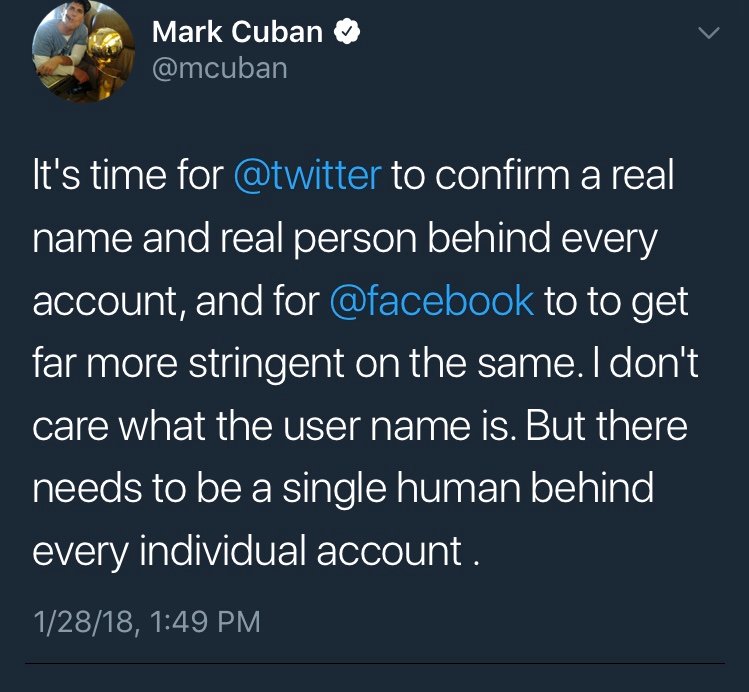Sunday afternoon, billionaire investor and reality TV personality Mark Cuban made it known via a tweet that he believes accounts on social media should be verified as being connected to a real individual. This would of course prevent individuals from creating multiple accounts, which would in theory prevent an individual from using bots and fake accounts to blast out a particular message to the network. This is undoubtedly related to the allegation that the Russian Government used social media bots to help bolster the presidential campaign of then candidate, Donald J Trump. If the idea Mr. Cuban proposes is implemented, it will surely change the nature of social media forever. It is also interesting that these remarks come from Cuban who supported Hillary Clinton for president during the 2016 campaign. It is well known that Mrs. Clinton perceives voter ID laws to be racist and unfair. With this in mind, would ID laws for social media accounts not also be racist and unfair? Why do people like Mr. Cuban seem to believe that the barriers to entry for a Facebook or Twitter account should be higher than those for electing the nation’s leaders?
Before examining the motivations behind Mr. Cuban’s thinking here, it is important we examine the effects that the proposal could potentially have on major social media outlets such as Facebook and Twitter. The most obvious change of course, would the limiting of accounts to one per user, whereas right now the number of Twitter or Facebook accounts one might create is limited only by the number of email addresses they are willing to set up. This would likely mean an end to the bots and spam accounts that Mr. Cuban sees as a problem; however it also creates a variety of other changes. Firstly, it removes any illusion of anonymity. Even if companies were to allow pseudonymous public handles, the fact that verified ID information is stored in connection with the accounts makes the networks non-starters for transferring any sort of sensitive information that one does not want to be directly associated with.
This 1:1 verification for accounts would also likely negatively impact people who operate multiple accounts for legitimate purposes. Individuals often utilize multiple Twitter accounts to use one professionally and one personally; politicians do this frequently. A writer operating multiple blogs may use separate twitter profiles to promote each blog to its target audience without having to irritate either audience with unnecessary crossover. These are just two of the many examples of how the allowance for multiple accounts often plays a large role in a social network’s utility. Were major social media players to take this away from users, it would likely be followed by a mass exodus of users to services with less stringent requirements for sign up. As such, the problem would likely pop up again until either this ID requirement went away or was enforced via regulation. This would be tantamount to a national registry for citizens and likely would not sit well with the American people.
Clearly Cuban’s proposal is not business oriented due to the obvious negative impact it would have on the success of social networks. It is likely then a politically motivated opinion that Cuban is espousing here. Even then, however, it is still difficult to discern any sort of positive end game from Cuban’s perspective. Cuban ardently opposed the election of Donald J Trump and was one of Hillary Clinton’s most vocal high profile supporters. One of the most polarizing issues of the 2016 campaign was voter ID laws, with many of those on the Trump side calling for more laws requiring the verification of one’s identity before voting, and those aligned with Clinton claiming such measures to be oppressive and unfair to working class/minority communities. Would the same logic not then follow were we to have ID rules for social media? Surely, if an impoverished individual is not able to go through the process of procuring an ID for something as important as voting, they similarly would not be able/willing to do so just to create a profile on Twitter or Facebook. Is Cuban suggesting we make it more difficult for impoverished and minority communities to access social media freely as the rest of us do? It would likely be unfair to say that this is his intention, but according to the logic of those who Mr. Cuban chooses to align with politically, it would be the end result of the measures he proposes.
Cuban’s remarks demonstrate that despite being a highly respected tech investor, he has to some degree lost touch with the direction in which the industry is heading. For better or worse, technology has for sometime trended, and will continue to trend towards, less centralization, more anonymity, and greater privacy. Whether Cuban is actively choosing to disregard/combat this trend or is simply unaware of it is debatable, but the fact remains the line of thinking put forward by the Shark Tank star here, within the context of tech industry, is held almost exclusively by large, established, corporate players who have a status quo to maintain. In the corners of the tech markets where we are seeing true innovation, open dialogue, and the development of tech that will help us for years to come, the trend is overwhelmingly in favor of tech that lends itself to privacy and decentralization.

Requiring tougher ID laws for a social media account then to be able to vote (Voter ID) is crazy.
But you are exactly right - that is exactly what so many Democrats are supporting by implication
Those who cannot remember the past are condemned to repeat it.
Good points. As always people like Mark Cuban never say anything like this unless it benefits them and/or hurts thier ideological opponents.